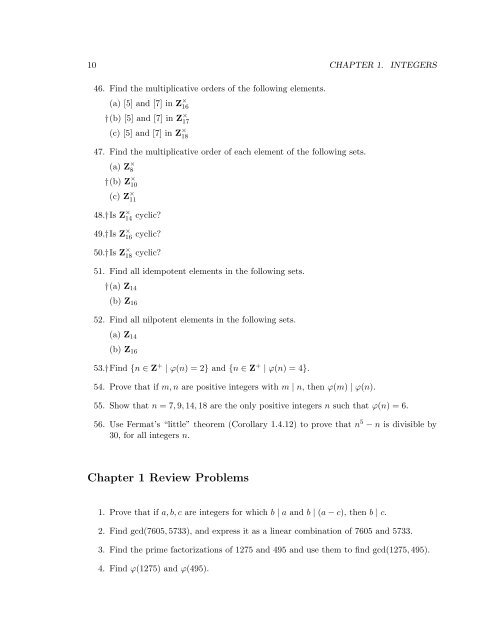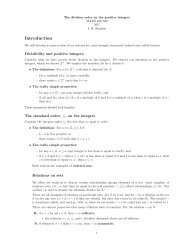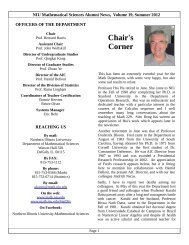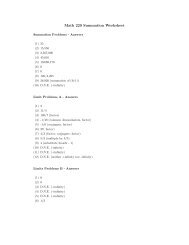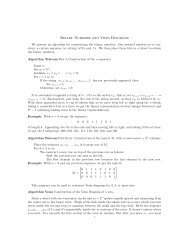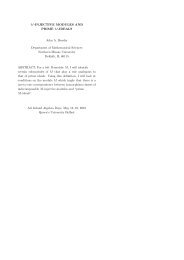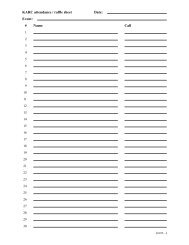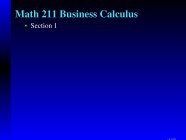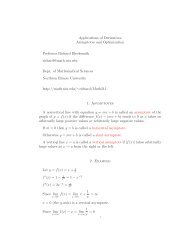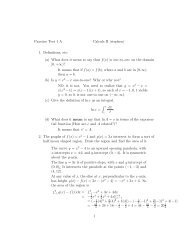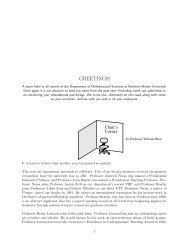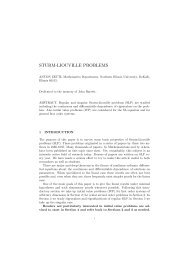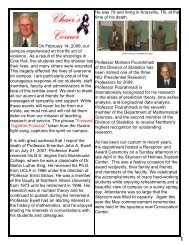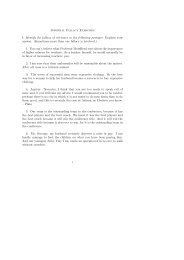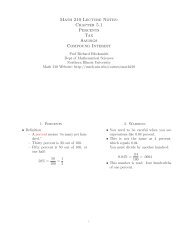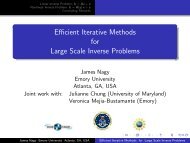- Page 1 and 2: ABSTRACT ALGEBRA: A STUDY GUIDE FOR
- Page 3 and 4: Contents PREFACE vi 1 INTEGERS 1 1.
- Page 5 and 6: CONTENTS v 5 Commutative Rings 157
- Page 7 and 8: Chapter 1 INTEGERS Chapter 1 of the
- Page 9 and 10: 1.2. PRIMES 3 (d) a = 12345 , b = 9
- Page 11 and 12: 1.3. CONGRUENCES 5 1.3 Congruences
- Page 13 and 14: 1.3. CONGRUENCES 7 45.†Solve the
- Page 15: 1.4. INTEGERS MODULO N 9 SOLVED PRO
- Page 19 and 20: Chapter 2 FUNCTIONS The first goal
- Page 21 and 22: 2.1. FUNCTIONS 15 33. Let A be an n
- Page 23 and 24: 2.2. EQUIVALENCE RELATIONS 17 SOLVE
- Page 25 and 26: 2.3. PERMUTATIONS 19 30.†Let ∼
- Page 27 and 28: 2.3. PERMUTATIONS 21 Chapter 2 Revi
- Page 29 and 30: Chapter 3 GROUPS The study of group
- Page 31 and 32: 3.1. DEFINITION OF A GROUP 25 Table
- Page 33 and 34: 3.1. DEFINITION OF A GROUP 27 36.
- Page 35 and 36: 3.2. SUBGROUPS 29 29. Find all cycl
- Page 37 and 38: 3.2. SUBGROUPS 31 54.† In each of
- Page 39 and 40: 3.3. CONSTRUCTING EXAMPLES 33 25. F
- Page 41 and 42: 3.4. ISOMORPHISMS 35 (b) Show that
- Page 43 and 44: 3.4. ISOMORPHISMS 37 MORE PROBLEMS:
- Page 45 and 46: 3.5. CYCLIC GROUPS 39 27. In Z45 fi
- Page 47 and 48: 3.6. PERMUTATION GROUPS 41 29. In t
- Page 49 and 50: 3.7. HOMOMORPHISMS 43 26. For the g
- Page 51 and 52: 3.8. COSETS, NORMAL SUBGROUPS, AND
- Page 53 and 54: 3.8. COSETS, NORMAL SUBGROUPS, AND
- Page 55 and 56: Chapter 4 POLYNOMIALS In this chapt
- Page 57 and 58: 4.1. FIELDS; ROOTS OF POLYNOMIALS 5
- Page 59 and 60: 4.2. FACTORS 53 23. Find the greate
- Page 61 and 62: 4.4. POLYNOMIALS OVER Z, Q, R, AND
- Page 63 and 64: 4.4. POLYNOMIALS OVER Z, Q, R, AND
- Page 65 and 66: Chapter 5 COMMUTATIVE RINGS This ch
- Page 67 and 68:
5.2. RING HOMOMORPHISMS 61 34. Let
- Page 69 and 70:
5.3. IDEALS AND FACTOR RINGS 63 5.3
- Page 71 and 72:
5.4. QUOTIENT FIELDS 65 Chapter 5 R
- Page 73 and 74:
Chapter 6 FIELDS These review probl
- Page 75 and 76:
Chapter 1 Integers 1.1 Divisors 25.
- Page 77 and 78:
1.1. DIVISORS 71 � 1 0 3553 0 1 5
- Page 79 and 80:
1.1. DIVISORS 73 where the remainde
- Page 81 and 82:
1.2. PRIMES 75 250 � ❅ 50 125
- Page 83 and 84:
1.2. PRIMES 77 35. Prove that gcd(2
- Page 85 and 86:
1.3. CONGRUENCES 79 (b) Find all so
- Page 87 and 88:
1.3. CONGRUENCES 81 40. Prove that
- Page 89 and 90:
1.4. INTEGERS MODULO N 83 Finally,
- Page 91 and 92:
1.4. INTEGERS MODULO N 85 41. Solve
- Page 93 and 94:
1.4. INTEGERS MODULO N 87 � �
- Page 95 and 96:
Chapter 2 Functions 2.1 Functions 2
- Page 97 and 98:
2.1. FUNCTIONS 91 28. Let a be a fi
- Page 99 and 100:
2.1. FUNCTIONS 93 First, if L has a
- Page 101 and 102:
2.2. EQUIVALENCE RELATIONS 95 15. F
- Page 103 and 104:
2.2. EQUIVALENCE RELATIONS 97 the l
- Page 105 and 106:
2.3. PERMUTATIONS 99 21. Prove that
- Page 107 and 108:
2.3. PERMUTATIONS 101 Solution: We
- Page 109 and 110:
Chapter 3 Groups 3.1 Definition of
- Page 111 and 112:
3.1. DEFINITION OF A GROUP 105 30.
- Page 113 and 114:
3.1. DEFINITION OF A GROUP 107 f1(z
- Page 115 and 116:
3.2. SUBGROUPS 109 39. For each bin
- Page 117 and 118:
3.2. SUBGROUPS 111 34. Let G be an
- Page 119 and 120:
3.2. SUBGROUPS 113 40. Prove that a
- Page 121 and 122:
3.3. CONSTRUCTING EXAMPLES 115 Comm
- Page 123 and 124:
3.3. CONSTRUCTING EXAMPLES 117 �
- Page 125 and 126:
3.4. ISOMORPHISMS 119 Answer: HK =
- Page 127 and 128:
3.4. ISOMORPHISMS 121 and so φ : G
- Page 129 and 130:
3.4. ISOMORPHISMS 123 since by assu
- Page 131 and 132:
3.5. CYCLIC GROUPS 125 Hint: Define
- Page 133 and 134:
3.5. CYCLIC GROUPS 127 32. Find all
- Page 135 and 136:
3.6. PERMUTATION GROUPS 129 Exercis
- Page 137 and 138:
3.7. HOMOMORPHISMS 131 possibilitie
- Page 139 and 140:
3.8. COSETS, NORMAL SUBGROUPS, AND
- Page 141 and 142:
3.8. COSETS, NORMAL SUBGROUPS, AND
- Page 143 and 144:
3.8. COSETS, NORMAL SUBGROUPS, AND
- Page 145 and 146:
3.8. COSETS, NORMAL SUBGROUPS, AND
- Page 147 and 148:
3.8. COSETS, NORMAL SUBGROUPS, AND
- Page 149 and 150:
Chapter 4 Polynomials 4.1 Fields; R
- Page 151 and 152:
4.2. FACTORS 145 This gives us the
- Page 153 and 154:
4.2. FACTORS 147 over Z3. Using the
- Page 155 and 156:
4.3. EXISTENCE OF ROOTS 149 4.3 Exi
- Page 157 and 158:
4.4. POLYNOMIALS OVER Z, Q, R, AND
- Page 159 and 160:
4.4. POLYNOMIALS OVER Z, Q, R, AND
- Page 161 and 162:
4.4. POLYNOMIALS OVER Z, Q, R, AND
- Page 163 and 164:
Chapter 5 Commutative Rings 5.1 Com
- Page 165 and 166:
5.1. COMMUTATIVE RINGS; INTEGRAL DO
- Page 167 and 168:
5.2. RING HOMOMORPHISMS 161 28. Let
- Page 169 and 170:
5.3. IDEALS AND FACTOR RINGS 163 so
- Page 171 and 172:
5.4. QUOTIENT FIELDS 165 In the gen
- Page 173 and 174:
5.4. QUOTIENT FIELDS 167 Z36. The l
- Page 175 and 176:
Chapter 6 Fields 1. Let u be a root
- Page 177:
BIBLIOGRAPHY 171 BIBLIOGRAPHY Allen


